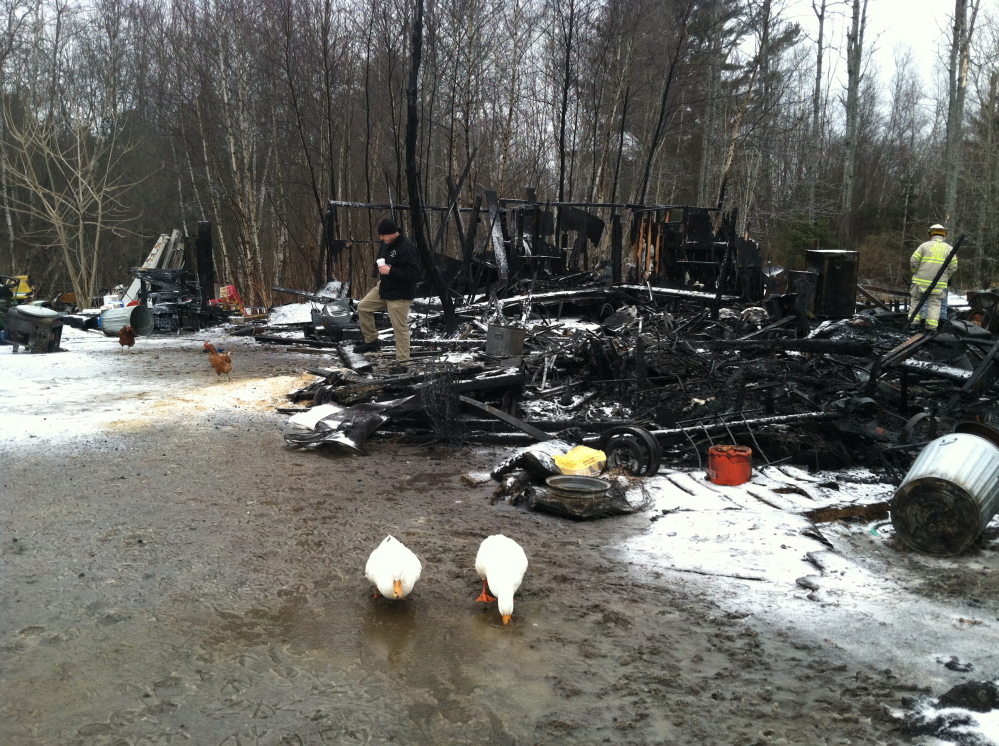NORTH YARMOUTH — Investigators say they don’t know what started a barn fire early Monday that killed 500 chicks and 30 sheep, but there’s a good chance it had something to do with the warming apparatus for the animals.
“There were a lot of heat lamps and a lot of electrical stuff in the barn,” said Sgt. Joel Davis of the State Fire Marshal’s Office. Investigators could not precisely determine, however, where the fire started and whether the source was a malfunctioning heat lamp or a damaged electrical cord.
The fire at Serendipity Acres was discovered at 2 a.m. by one of the farmers, but he was unable to rescue the animals, said acting Fire Chief Harold Stoddard.
“He just said it took off very quickly,” Stoddard said. “Before he could get any of the animals out, it was fully involved.”
The farm is located at the end of a long, narrow driveway on West Pownal Road. Firefighters took a single engine up to the property and dropped one end of a hose at the end of the driveway, Stoddard said. Another crew fed water into that end of the hose, while firefighters saturated the burning barn and two other smaller structures. The barn and one of the other structures, a lean-to, were destroyed while the third was damaged.
There were 500 chicks inside the barns, as well as 30 sheep – 11 adults and 19 newborn kids. Three adult sheep that were penned outside the barn escaped, Stoddard said. Another 600 chicks in a separate building were not injured, he said.
Serendipity Acres is an organic farm that sells pasture-raised chickens, turkeys and lambs and produces wool, sheepskins and eggs, according to its website. The farm sells products at local farmers’ markets and directly to restaurants.
Serendipity Acres is run by Jules Fecteau and her family, according to the Portland Farmers’ Market website. The property is owned by Jules Fecteau’s mother, Rosemary Fecteau.
The fire is not considered suspicious, officials said.
There are two or three fires a year in Maine related to warming apparatus for young chickens, Davis said. A fatal fire on March 10 in Limington started when a light bulb that was being used to warm chicks on a dining room table ignited some newspaper.
Lisa Turner of Laughing Stock Farm in Freeport said her family endured a barn fire in 2003 that killed their brooding chickens.
“It is emotionally devastating to lose the animals,” she said. “And we had a beautiful post-and-beam barn.”
Turner recalled that it was a windy, rainy night and investigators concluded that the cold, wind-driven rain hitting the hot glass of a heat lamp caused the lamp to malfunction and ignite sawdust spread on the floor to keep the chicks warm.
The heat lamps can be used for chicks as well as for lambs, which can be susceptible to cold, she said.
Turner said she doesn’t know Jules Fecteau well, but has bought chickens from her in the past. The two farms sell to some of the same restaurants.
“She seemed like a very nice person,” Turner said.
Laura Grady, who runs Two Coves Farm in Harpswell with her husband, said that at this time of year, many people who raise chickens are taking delivery of their chicks.
“They were probably laying hens,” she said. “We have ours coming Wednesday.”
Grady, who also raises sheep, said the fire is a wake-up call for other farmers.
“You always have that fear” of a fire, she said. “We’ve been using heat lamps for a long time.”
She said the fire was a reminder of the need to put cages around heat lamps so they won’t ignite their surroundings if they are knocked over.
A number of chickens and ducks were roaming the yard Monday as Stoddard and an investigator with the Fire Marshal’s Office inspected the damage at the farm.
The two barns were in close proximity to each other, Stoddard said. Town tax records list a 1,100-square-foot barn, a 770-square-foot lean-to and 290-square-foot cabin. Stoddard said each had power and its own heat source.
The farmers, Fecteau and her boyfriend, live in a yurt across the yard from the barns. The 30-foot-diameter structure was in no danger, Stoddard said.
The homeowners did not know how much of the loss is covered by insurance, and are checking their policy, he said.
Turner said that during her barn fire in 2003, one of the most eye-opening parts of the experience was discovering that their loss was only partially covered because their insurance was for less than the property was worth. They lost some of the infrastructure of the business as well as part of the product they were counting on for income, she said.
“Our experience was, it doesn’t necessarily matter what you bought for insurance,” she said. “You’re about to find out what the fine print says.”
David Hench can be contacted at 791-6327 or at:
Twitter: @Mainehenchman
Send questions/comments to the editors.



Comments are no longer available on this story